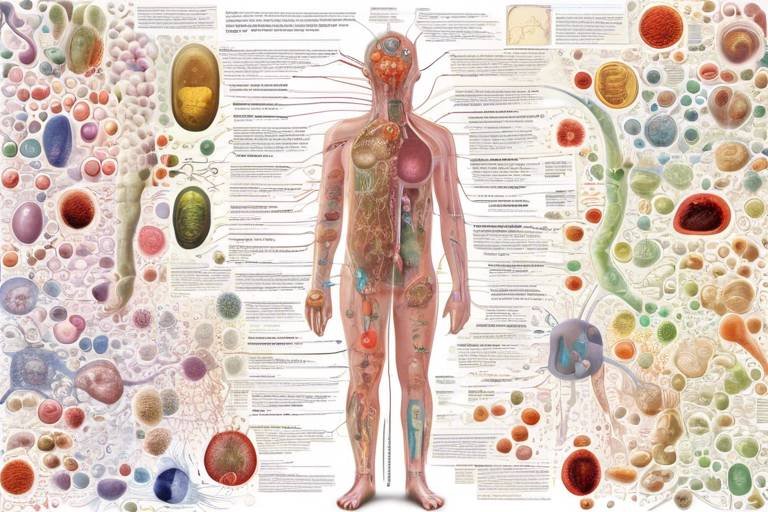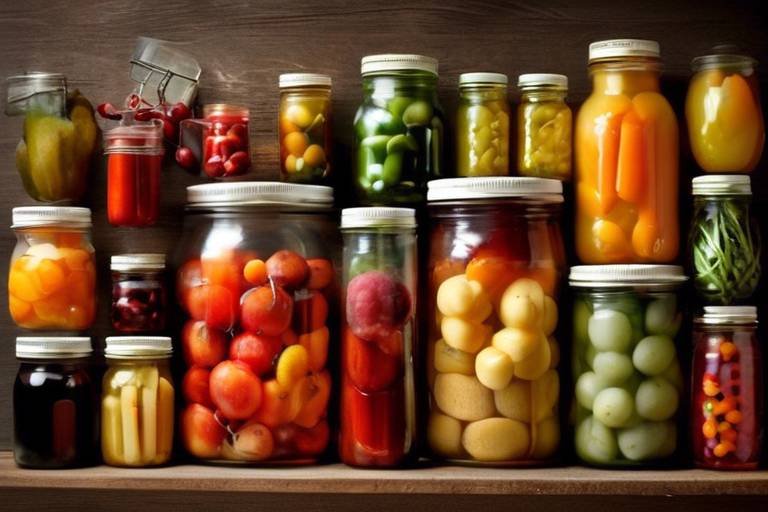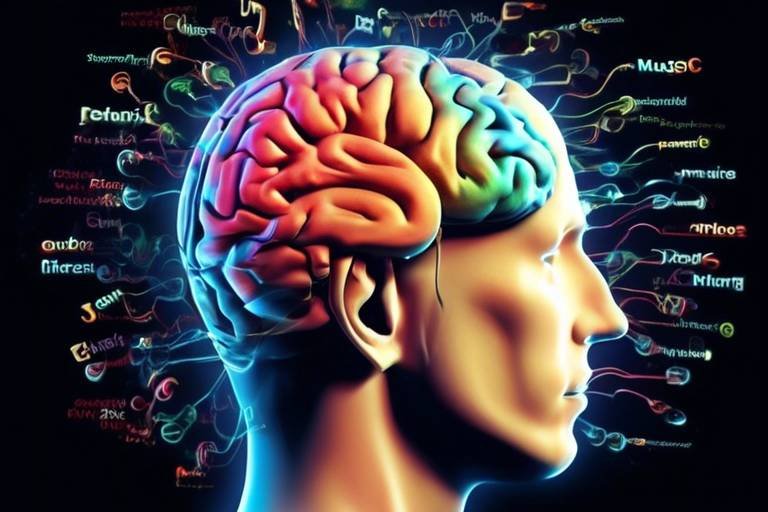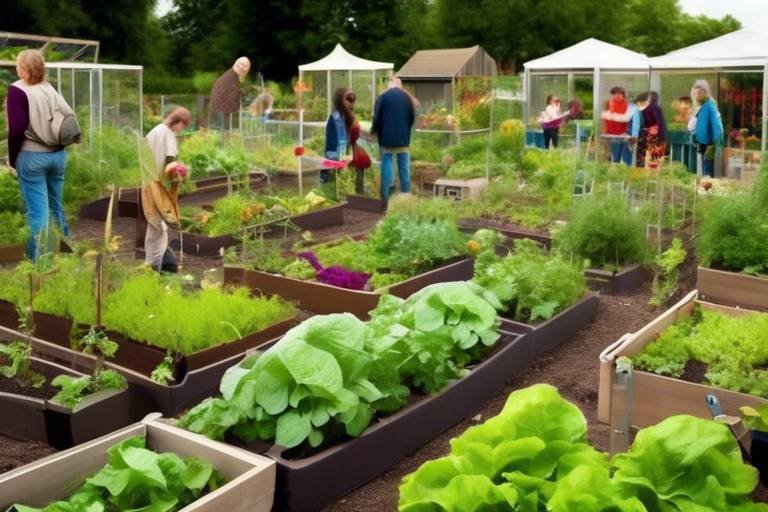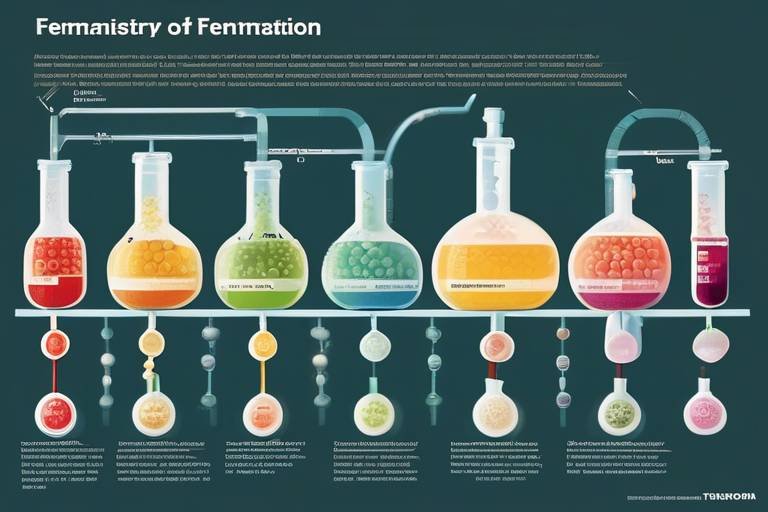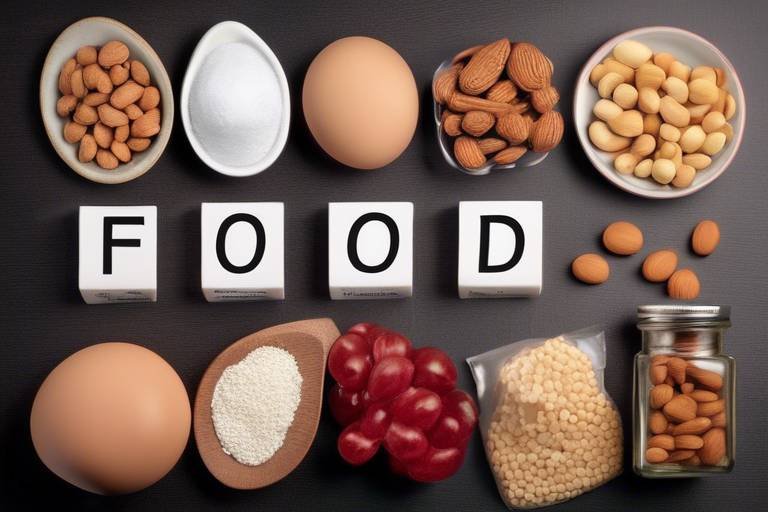The Biology of the Human Microbiome - Our Inner Ecosystem
The human microbiome is a captivating and intricate world teeming with life, comprising trillions of microorganisms that reside in and on our bodies. Imagine a bustling city, where each microbe plays a unique role, contributing to the overall health and functionality of the body. This inner ecosystem is not just a passive collection of bacteria; it's a dynamic community that influences everything from our digestion to our immune responses, shaping our biology in profound ways.
To truly appreciate the significance of the microbiome, we must first understand its composition. The microbiome is primarily made up of bacteria, but it also includes viruses, fungi, and other microorganisms. These tiny inhabitants are often categorized based on their location in the body, such as the gut, skin, mouth, and even the vaginal microbiome. Each of these locations hosts a distinct microbial community that interacts with our cells, influencing our metabolism, immune function, and even our mood. It’s like having a symphony orchestra within us, where each instrument plays its part to create a harmonious melody of health.
Research has shown that the microbiome is crucial for maintaining our overall well-being. For instance, gut microbes help break down complex carbohydrates, enabling us to absorb essential nutrients. They also synthesize vitamins, such as B vitamins and vitamin K, which are vital for various bodily functions. Moreover, these microorganisms play a key role in protecting us from harmful pathogens by competing for resources and producing substances that inhibit the growth of unwanted bacteria. In essence, our microbiome acts as a shield, defending us against potential threats while promoting a balanced internal environment.
But what happens when this delicate balance is disrupted? Factors such as poor diet, stress, and antibiotic use can lead to an imbalance in our microbial communities, resulting in what is known as dysbiosis. This condition can have far-reaching consequences, contributing to a range of health issues, including gastrointestinal disorders, obesity, and even mental health problems. It's a stark reminder of how interconnected our health is with the microorganisms that inhabit our bodies.
As we continue to explore the microbiome's complexities, it's becoming increasingly clear that fostering a healthy microbiome is essential for our overall health. This involves understanding the intricate relationships between different microbial species and how they interact with our bodies. By prioritizing a diet rich in diverse nutrients and minimizing factors that disrupt microbial balance, we can nurture our inner ecosystems and pave the way for a healthier future.
- What is the human microbiome? The human microbiome refers to the collection of trillions of microorganisms, including bacteria, viruses, and fungi, that live in and on our bodies.
- How does the microbiome affect health? The microbiome plays a crucial role in digestion, nutrient absorption, immune function, and protecting against harmful pathogens.
- What can disrupt the microbiome? Factors such as poor diet, stress, antibiotic use, and lack of sleep can disrupt the balance of the microbiome, leading to health issues.
- How can I support a healthy microbiome? Eating a diverse diet rich in fruits, vegetables, whole grains, and fermented foods can help support a balanced microbiome.

[What is the Human Microbiome?]
The human microbiome is an astonishingly complex community of trillions of microorganisms that reside in and on our bodies. Imagine this as a bustling city, where each microbe plays a unique role, contributing to the overall health and function of our biological ecosystem. These microorganisms include bacteria, viruses, fungi, and even single-celled organisms, collectively forming a diverse and intricate web of life that is essential to our existence.
To put it simply, the microbiome can be thought of as our own personal ecosystem, with each species interacting with one another and impacting our health in ways we are just beginning to understand. The composition of the microbiome varies from person to person, influenced by a myriad of factors including genetics, environment, and lifestyle choices. Studies estimate that the human microbiome contains over 10,000 different species of microbes, each with its own distinct functions and benefits.
These tiny inhabitants are not just passive residents; they actively participate in numerous biological processes. For instance, they play a crucial role in disease prevention, digestion, and the synthesis of essential vitamins. In fact, without these microorganisms, our bodies would struggle to break down complex carbohydrates and absorb key nutrients. It’s like having a team of expert chefs in your gut, ensuring that every meal is not only digested properly but also transformed into energy and nourishment for your body.
Furthermore, the microbiome is integral to our immune system. It acts as a first line of defense against harmful pathogens by competing for resources and producing substances that inhibit the growth of these invaders. When our microbiome is balanced and diverse, it can effectively communicate with our immune system, helping to maintain a state of homeostasis. However, when this balance is disrupted, it can lead to a range of health issues, from allergies to chronic diseases.
In summary, the human microbiome is a vital component of our biology, shaping our health and well-being in profound ways. Understanding this inner ecosystem not only provides insights into how we function but also opens up new avenues for improving health through targeted interventions, such as dietary changes and probiotics. As we delve deeper into this fascinating subject, it's clear that the microbiome is not just a collection of microbes; it’s a dynamic, living system that plays a critical role in our lives.

[The Role of Gut Microbes]
Gut microbes, often referred to as the "forgotten organ," play an absolutely crucial role in our overall health and well-being. These trillions of microorganisms, which include bacteria, fungi, and viruses, reside primarily in our intestines, creating a complex ecosystem that influences everything from digestion to immune function. Imagine your gut as a bustling city, where each microbe is a resident contributing to the city's health and vibrancy. Without these residents, the city would struggle to thrive.
One of the primary functions of gut microbes is to assist in the detection and absorption of nutrients. They break down complex carbohydrates that our bodies cannot digest on their own, transforming them into short-chain fatty acids, which are vital for our energy needs. This process not only aids in digestion but also helps regulate our metabolism. For instance, when we consume fiber-rich foods, gut microbes ferment these fibers, producing beneficial compounds that can influence our body's energy balance and fat storage.
Besides aiding in digestion, gut microbes also serve as a protective barrier against harmful pathogens. They compete for resources and space, effectively crowding out bad bacteria and viruses that could lead to infections. This defense mechanism is a critical aspect of our immune system, as a healthy microbiome can help train our immune cells to distinguish between harmful invaders and harmless substances. In essence, gut microbes act as both a shield and a sword, defending our bodies against disease while promoting a balanced immune response.
The diversity of gut microbes is another key factor in their role. A diverse microbiome is like a well-rounded community, where various species coexist and support one another. Research has shown that individuals with a more diverse gut microbiome tend to experience better health outcomes, including lower risks of obesity, inflammatory diseases, and even mental health issues. In contrast, a less diverse microbiome can lead to imbalances, resulting in conditions such as irritable bowel syndrome (IBS) or food intolerances.
To illustrate the importance of gut microbe diversity, consider the following table that highlights some common microbial species and their associated benefits:
| Microbial Species | Benefits |
|---|---|
| Lactobacillus | Helps in lactose digestion and produces lactic acid, which inhibits harmful bacteria. |
| Bifidobacterium | Supports immune function and helps maintain gut barrier integrity. |
| Faecalibacterium prausnitzii | Produces anti-inflammatory compounds and is linked to reduced risk of inflammatory bowel diseases. |
In conclusion, gut microbes are not just passive inhabitants of our digestive system; they are active participants in maintaining our health. They help us digest food, protect us from harmful pathogens, and even influence our immune responses. The intricate balance of these microorganisms is vital, and understanding their roles can empower us to make informed choices about our diets and lifestyles. So, the next time you think about your gut health, remember that it's not just about what you eat—it's also about the vibrant community of microbes that call your gut home.
- What are gut microbes? Gut microbes are trillions of microorganisms, including bacteria, fungi, and viruses, that live in our intestines and help with digestion, immune function, and more.
- How do I maintain a healthy gut microbiome? A balanced diet rich in fiber, fermented foods, and probiotics can support a healthy gut microbiome.
- What happens if I have low gut microbiome diversity? Low diversity can lead to health issues such as obesity, autoimmune diseases, and digestive disorders.

[Microbiome Diversity]
The concept of microbiome diversity is akin to having a vibrant city bustling with various cultures and communities. Just as a city thrives on the interaction of its diverse inhabitants, our bodies benefit immensely from a rich tapestry of microorganisms. The human microbiome is home to trillions of microbes, including bacteria, viruses, fungi, and archaea, all cohabiting in a delicate balance. This diversity is not just a fascinating fact; it plays a critical role in our overall health and well-being.
Research has shown that a diverse microbiome can enhance our resilience against diseases. When we have a variety of microbial species, they work together to perform essential functions, such as breaking down food, synthesizing vitamins, and training our immune system. For example, certain beneficial bacteria can outcompete harmful pathogens, preventing them from establishing themselves in our bodies. This is similar to how a well-mixed salad, with its different ingredients, creates a more flavorful and nutritious dish compared to a bowl of just one type of vegetable.
Moreover, the diversity of our microbiome can influence our susceptibility to various health conditions. A study published in the journal Nature highlighted that individuals with a more diverse gut microbiome tend to have lower risks of obesity, diabetes, and even mental health disorders. It’s like having a robust defense system where each microbe plays a unique role, contributing to the overall strength of the organism. Conversely, a lack of diversity can lead to a weakened defense mechanism, making us more vulnerable to illnesses.
But what exactly contributes to this microbial diversity? Several factors come into play, including our diet, lifestyle, and environment. For instance, a diet rich in fiber and fermented foods can significantly enhance microbiome diversity. Foods like yogurt, sauerkraut, and kimchi introduce beneficial bacteria, while fiber acts as a food source for these microbes, allowing them to thrive. On the flip side, a diet high in processed foods and sugars can diminish microbial variety, leading to a less resilient microbiome.
In summary, microbiome diversity is a crucial aspect of our health. By nurturing a wide range of microbial species through our dietary choices and lifestyle habits, we can foster a balanced ecosystem within our bodies. This not only enhances our immunity but also improves our overall quality of life. So, next time you sit down for a meal, think about how you can make it a feast for your microbiome!
- What is microbiome diversity? Microbiome diversity refers to the variety of microorganisms present in our bodies, which plays a crucial role in maintaining health.
- Why is diversity important for health? A diverse microbiome can improve immune function, enhance nutrient absorption, and lower the risk of chronic diseases.
- How can I increase my microbiome diversity? You can increase diversity by consuming a varied diet rich in fruits, vegetables, whole grains, and fermented foods.

[Factors Influencing Diversity]
The diversity of our microbiome is not a random occurrence; it is influenced by a myriad of factors that shape the microbial communities within us. Think of your microbiome as a bustling city, where various neighborhoods represent different microbial species. Just like a city thrives on diversity, with different cultures and ideas, our microbiome flourishes when it hosts a wide array of microorganisms. So, what are the key players in this intricate game of microbial diversity? Let's dive into some of the most significant factors.
One of the most substantial influences on microbiome diversity is our diet. The foods we consume serve as the primary fuel for our gut bacteria. For instance, a diet rich in fiber, such as fruits, vegetables, and whole grains, can promote the growth of beneficial bacteria. In contrast, a diet high in processed foods and sugars can lead to an overgrowth of harmful bacteria. This dietary impact can be likened to a garden; a diverse array of plants (or foods) leads to a vibrant ecosystem, while a lack of variety can result in a barren landscape.
Another critical factor is lifestyle. Regular physical activity, for example, has been shown to enhance microbial diversity. Exercise not only helps maintain a healthy weight but also fosters the growth of beneficial bacteria that can improve our metabolic health. On the flip side, sedentary lifestyles can lead to a decline in microbial variety, akin to a city losing its vibrancy when residents become inactive and disengaged.
Environmental influences also play a crucial role in shaping our microbiome. The exposure to different environments, whether urban or rural, can affect the types of microbes we host. For instance, individuals living in rural areas often have a more diverse microbiome compared to those in urban settings, possibly due to greater exposure to nature and a wider variety of microbial species. This can be compared to the idea of biodiversity in ecosystems; the more varied the environment, the richer the microbial tapestry.
Additionally, factors such as age and genetics cannot be overlooked. As we age, our microbiome undergoes changes, often becoming less diverse. This decline can be attributed to various factors, including changes in diet, lifestyle, and health status. Genetics also plays a foundational role in determining the composition of our microbiome, influencing how we respond to dietary changes and environmental factors.
Lastly, the use of antibiotics can have a profound impact on microbial diversity. While antibiotics are essential for fighting infections, they can indiscriminately kill both harmful and beneficial bacteria, leading to a significant reduction in diversity. This can set the stage for an imbalance, often referred to as dysbiosis, which is linked to numerous health issues. It's like using a bulldozer to clear a forest; while it might remove the unwanted trees, it also destroys the entire ecosystem.
In summary, the diversity of our microbiome is influenced by a complex interplay of diet, lifestyle, environmental exposures, age, genetics, and medical interventions. Understanding these factors can help us make informed choices to promote a balanced and thriving microbial community within us. Just as a city thrives on diversity and interaction, so too does our microbiome flourish when it hosts a rich variety of microorganisms.
- What is the microbiome? The microbiome refers to the collection of trillions of microorganisms, including bacteria, viruses, fungi, and other microbes, living in and on our bodies.
- How does diet affect the microbiome? Diet plays a pivotal role in shaping the microbiome by providing the necessary nutrients that either promote beneficial bacteria or allow harmful ones to thrive.
- Can lifestyle changes improve microbiome diversity? Yes, lifestyle changes such as regular exercise, a balanced diet, and reducing stress can enhance microbial diversity and overall gut health.
- What are probiotics and prebiotics? Probiotics are live beneficial bacteria, while prebiotics are dietary fibers that feed these bacteria, helping to maintain a healthy gut microbiome.

[Consequences of Low Diversity]
Low microbiome diversity can have significant consequences for our health, acting like a silent saboteur in our bodies. Imagine your gut as a bustling city, where different microbial species represent various neighborhoods. When diversity decreases, it’s akin to shutting down entire neighborhoods, leading to a less vibrant and functional ecosystem. Research has shown that a lack of microbial variety can contribute to a range of health issues, including obesity, autoimmune diseases, and even mental health disorders.
For instance, a diverse microbiome helps regulate our immune system. When diversity is low, the immune system can become imbalanced, making us more susceptible to infections and chronic inflammation. This imbalance is often linked to conditions such as allergies and asthma, where the body overreacts to harmless substances. Furthermore, low diversity has been associated with metabolic disorders, as it can affect how our bodies process nutrients and manage weight. In fact, studies have indicated that individuals with obesity often exhibit a less diverse microbiome compared to those with a healthy weight.
Moreover, the consequences of low diversity extend beyond physical health. Mental health is increasingly recognized as being influenced by our gut microbiome. The gut-brain axis—a communication network linking the gut and the brain—can be disrupted when microbial diversity is compromised. This disruption may lead to increased anxiety, depression, and even cognitive decline. In essence, the health of our microbiome is intricately linked to our overall well-being, making it crucial to maintain a rich microbial community.
To illustrate the impact of low diversity, consider the following table that highlights various health conditions associated with reduced microbiome diversity:
| Health Condition | Associated Risks |
|---|---|
| Obesity | Impaired metabolism, increased fat storage |
| Autoimmune Diseases | Overactive immune response, systemic inflammation |
| Allergies | Increased sensitivity to environmental triggers |
| Mental Health Disorders | Anxiety, depression, cognitive decline |
In conclusion, maintaining a diverse microbiome is not just about digestion; it is essential for our overall health. By nurturing our microbial communities through a balanced diet and healthy lifestyle choices, we can help prevent the adverse effects associated with low diversity. After all, a thriving microbiome is a cornerstone of a vibrant life!
- What is microbiome diversity? Microbiome diversity refers to the variety of microorganisms present in our gut and their ecological balance, which is crucial for health.
- How can I improve my microbiome diversity? You can improve microbiome diversity by consuming a varied diet rich in fruits, vegetables, whole grains, and fermented foods.
- What are the signs of low microbiome diversity? Signs may include digestive issues, frequent infections, fatigue, and unexplained weight changes.
- Are probiotics effective in increasing microbiome diversity? Probiotics can help, but it's essential to combine them with a diverse diet for the best results.

[Microbiome and Immune Function]
The human microbiome is not just a collection of microorganisms; it is a vital player in our immune system's defense strategy. Think of it as a well-trained army, where each microbe has its role in protecting the body from invaders. These tiny soldiers help our immune system recognize harmful pathogens while also keeping it from overreacting to harmless substances, like food or pollen. Without this delicate balance, our bodies could easily fall into chaos, leading to allergies, autoimmune diseases, and other health issues.
One of the most fascinating aspects of the microbiome's relationship with our immune system is its ability to educate immune cells. When beneficial microbes flourish in our gut, they produce a variety of substances, including short-chain fatty acids (SCFAs). These SCFAs are like the secret weapons of our microbiome, signaling the immune system to function optimally. They help modulate inflammation and support the development of regulatory T cells, which are crucial for maintaining immune tolerance. In essence, a healthy microbiome acts as a mentor, teaching our immune system how to respond appropriately to threats.
Moreover, the diversity of our microbiome plays a significant role in immune function. A rich variety of microbial species can enhance the immune response, making it more adaptable to different challenges. Conversely, a lack of diversity may lead to a weakened immune system, making us more susceptible to infections and diseases. Studies have shown that individuals with a diverse microbiome tend to have better immune responses, highlighting the importance of nurturing our microbial friends.
To illustrate this relationship further, let's take a look at the table below, which summarizes how various microbes influence immune function:
| Microbe Type | Function | Impact on Immune System |
|---|---|---|
| Bifidobacteria | Ferments dietary fibers | Enhances immune response and reduces inflammation |
| Lactobacillus | Produces lactic acid | Inhibits pathogen growth and boosts local immunity |
| Faecalibacterium | Produces SCFAs | Regulates immune responses and reduces inflammation |
It's clear that maintaining a balanced microbiome is essential for a well-functioning immune system. Factors such as diet, stress, and antibiotic use can dramatically affect our microbial landscape. For instance, a diet high in processed foods and sugar can lead to a decrease in beneficial bacteria, while a rich, varied diet filled with fruits, vegetables, and whole grains can promote microbial diversity and, consequently, a robust immune system.
So, how can we support our microbiome and, in turn, our immune health? It starts with making informed dietary choices. Incorporating fermented foods like yogurt, kefir, and sauerkraut can introduce beneficial bacteria into our gut. Additionally, prebiotic foods such as garlic, onions, and bananas serve as fuel for these microbes, helping them thrive. By fostering a healthy microbiome, we empower our immune system to function at its best, protecting us from illness and disease.
- What is the microbiome? The microbiome refers to the trillions of microorganisms, including bacteria, fungi, and viruses, that inhabit various parts of our body, particularly the gut.
- How does the microbiome affect the immune system? The microbiome educates and modulates the immune system, helping it distinguish between harmful pathogens and harmless substances, thus playing a crucial role in immune function.
- Can diet influence my microbiome? Absolutely! A balanced diet rich in fiber, probiotics, and prebiotics can promote a diverse and healthy microbiome, which is essential for optimal immune function.
- What happens if my microbiome is out of balance? An imbalanced microbiome can lead to various health issues, including increased susceptibility to infections, allergies, and autoimmune diseases.

[Impact of Diet on the Microbiome]
The connection between our diet and the human microbiome is nothing short of fascinating. Imagine your gut as a bustling city, where trillions of microorganisms live and work together. The food we eat serves as the fuel for this vibrant ecosystem. Just like how a city thrives on diversity and resources, our microbiome flourishes with a varied and nutrient-rich diet. The types of food we consume can either enhance or disrupt the delicate balance of these microbial communities, making it crucial to understand how our dietary choices impact our inner ecosystem.
Research has shown that a diet high in fiber, fruits, vegetables, and fermented foods can significantly boost the diversity and abundance of beneficial bacteria in our gut. These foods act like fertilizers, nourishing the good microbes and helping them thrive. Conversely, a diet laden with processed foods, sugars, and unhealthy fats can lead to a decline in microbial diversity, akin to a city running out of resources, which can have dire consequences for our health. For example, diets high in sugar can promote the growth of harmful bacteria, leading to inflammation and other health issues.
To illustrate this point, let’s take a look at some dietary components and their effects on the microbiome:
| Food Type | Effect on Microbiome |
|---|---|
| High-Fiber Foods (e.g., whole grains, beans) | Promotes growth of beneficial bacteria |
| Fermented Foods (e.g., yogurt, kimchi) | Introduces live beneficial bacteria |
| Processed Foods (e.g., sugary snacks) | Reduces microbial diversity |
| High-Fat Diets (e.g., fast food) | Promotes harmful bacteria growth |
Moreover, the impact of diet on the microbiome is not just about what we eat, but also how we eat. Mindful eating, which involves paying attention to our food and its origins, can enhance our relationship with our diet and, consequently, our microbiome. When we savor our meals, we tend to make healthier choices, opting for whole, unprocessed foods that are beneficial for our gut health.
In addition to food choices, hydration plays a vital role in maintaining a healthy microbiome. Water is essential for digestion and helps in the transportation of nutrients. A well-hydrated body supports the microbiome by ensuring that beneficial bacteria can thrive and function optimally.
Ultimately, the relationship between diet and the microbiome is complex and dynamic. By making conscious dietary choices, we can nurture our inner ecosystem, promoting a diverse and balanced microbiome that supports our overall health and well-being. So, the next time you sit down for a meal, think about the tiny inhabitants of your gut and how your food choices can either empower or hinder them. It’s a powerful reminder that we hold the reins to our health right on our plates!
- What foods are best for my microbiome? Foods rich in fiber, such as fruits, vegetables, and whole grains, as well as fermented foods like yogurt and sauerkraut, are excellent choices.
- Can I restore my microbiome after a poor diet? Yes! By adopting a balanced diet rich in diverse nutrients, you can help restore and enhance your microbiome.
- How long does it take for diet changes to affect my microbiome? Changes in your microbiome can occur relatively quickly, often within days to weeks of dietary adjustments.

[Probiotics and Prebiotics]
When it comes to nurturing our inner ecosystem, probiotics and prebiotics play a starring role. But what exactly are they, and why should we care? Probiotics are live microorganisms, often referred to as "good" bacteria, that can provide a host of health benefits when consumed in adequate amounts. Think of them as tiny superheroes for your gut, helping to maintain a healthy balance of microbes and fend off the bad guys. On the other hand, prebiotics are non-digestible food components that serve as nourishment for these beneficial bacteria. They are like the fertilizer that helps your garden of good bacteria flourish.
To put it simply, probiotics are the friendly inhabitants of your gut, while prebiotics are the food that keeps them thriving. Imagine your gut as a bustling city: probiotics are the residents who keep things running smoothly, and prebiotics are the resources they need to thrive. Without enough prebiotics, the probiotics might not have the energy to do their job effectively.
So, where can you find these dynamic duos? Probiotics are commonly found in fermented foods like yogurt, kefir, sauerkraut, kimchi, and kombucha. These foods not only taste great but also help populate your gut with beneficial bacteria. On the flip side, prebiotics can be found in a variety of foods, including:
- Garlic
- Onions
- Leeks
- Asparagus
- Bananas
- Whole grains
Incorporating both probiotics and prebiotics into your diet can lead to a healthier gut microbiome, which in turn can enhance your overall well-being. Research has shown that a well-balanced microbiome can improve digestion, boost your immune system, and even influence your mood. It's fascinating how these tiny organisms can have such a profound impact on our health!
However, not all probiotics are created equal. Different strains of probiotics can have different effects on the body. For instance, some strains may be particularly effective at alleviating digestive issues, while others might enhance immune function or even help with mental health. Therefore, it’s essential to choose probiotic supplements or foods that contain specific strains tailored to your health needs.
In conclusion, understanding the roles of probiotics and prebiotics is crucial for anyone looking to improve their gut health. By making informed dietary choices, you can cultivate a thriving ecosystem within your body, leading to enhanced health and vitality. Remember, your gut is not just a digestive organ; it’s a complex community that requires care and attention!
Q: Can I get enough probiotics and prebiotics from my diet alone?
A: Yes! A balanced diet rich in fermented foods and fiber can provide sufficient amounts of both probiotics and prebiotics. However, some people may benefit from supplements, especially if they have specific health concerns.
Q: How long does it take to see the benefits of probiotics?
A: The time it takes to notice benefits can vary. Some people may feel improvements in digestion within a few days, while others might take weeks to experience the full effects. Consistency is key!
Q: Are there any side effects of taking probiotics?
A: Most people tolerate probiotics well, but some may experience mild digestive upset initially. It's always best to consult a healthcare professional before starting any new supplement.

[Dietary Recommendations]
When it comes to nurturing our microbiome, what we put on our plates plays a monumental role. Imagine your gut as a vibrant garden, where each type of food acts as a different seed, capable of sprouting beneficial or harmful plants. To cultivate a flourishing ecosystem, it's essential to choose the right "seeds." So, what should you be eating to keep your microbiome thriving?
First and foremost, fiber-rich foods are the superheroes of gut health. These foods, such as fruits, vegetables, whole grains, and legumes, act like fertilizer for your good bacteria. They provide the necessary fuel that helps beneficial microbes flourish. For instance, foods like beans, lentils, and oats are packed with soluble fiber, which can boost the production of short-chain fatty acids, vital for gut health.
Next up, let’s talk about fermented foods. These are like the secret agents of the microbiome world. Foods such as yogurt, kefir, sauerkraut, kimchi, and kombucha are loaded with probiotics—live bacteria that can enhance the diversity of your gut flora. Incorporating these foods into your diet can help restore balance and improve overall gut function. Think of them as your gut's friendly neighborhood superheroes!
Another important aspect is polyphenols, which are found in foods like berries, green tea, and dark chocolate. These compounds not only provide antioxidants but also act as prebiotics, feeding the good bacteria in your gut. Imagine them as the sunshine that helps your garden grow—without them, your microbial garden may struggle to thrive.
It's also crucial to limit processed foods and added sugars. These can be detrimental to your microbiome, much like weeds that choke out the healthy plants in your garden. When you consume too many processed foods, you risk feeding harmful bacteria, which can lead to an imbalance in your gut flora. Instead, focus on whole, unprocessed foods that are rich in nutrients.
Lastly, hydration should not be overlooked. Drinking plenty of water helps maintain the mucosal lining of the intestines and supports the balance of good bacteria. Think of it as the rain that nourishes your garden, ensuring that your microbiome remains hydrated and healthy.
In summary, a diet that promotes a healthy microbiome should include:
- Fiber-rich foods: fruits, vegetables, legumes, and whole grains.
- Fermented foods: yogurt, kefir, kimchi, and sauerkraut.
- Polyphenol-rich foods: berries, green tea, and dark chocolate.
- Minimal processed foods and added sugars.
- Plenty of water to keep everything flowing smoothly.
By making these dietary adjustments, you can cultivate a thriving microbiome that supports not only digestive health but also enhances your overall well-being. Remember, your gut is a living ecosystem—treat it with care, and it will reward you in ways you might not even realize!
1. How long does it take to see improvements in my microbiome from dietary changes?
Changes in your microbiome can occur within days to weeks of altering your diet. However, significant shifts may take longer, so be patient and consistent with your healthy choices.
2. Can I take supplements instead of eating fermented foods?
While probiotic supplements can be beneficial, obtaining probiotics from fermented foods is generally more effective due to the variety of beneficial bacteria and nutrients they provide.
3. Is it possible to have too much fiber?
Yes, consuming excessive fiber suddenly can lead to digestive discomfort. It's best to gradually increase fiber intake and drink plenty of water to help your body adjust.
4. Are there specific foods to avoid for gut health?
Yes, it's advisable to limit processed foods, high-sugar items, and artificial sweeteners, as they can negatively impact your gut flora.
Frequently Asked Questions
- What is the human microbiome?
The human microbiome is a vast community of trillions of microorganisms, including bacteria, viruses, fungi, and other microbes, that reside in and on our bodies. These tiny organisms play a crucial role in our health, influencing everything from digestion to immune function.
- Why is gut health important?
Gut health is vital because it directly affects our overall well-being. A healthy gut microbiome aids in digestion, nutrient absorption, and even mental health. When our gut microbes are balanced, we are less likely to experience issues like bloating, inflammation, and even mood swings.
- How does microbiome diversity affect health?
Microbiome diversity is essential for a balanced ecosystem within our bodies. A diverse microbiome can help protect against diseases, while low diversity is linked to various health problems, including obesity and autoimmune conditions. It's like having a diverse garden; the more variety, the healthier and more resilient it is!
- What factors influence microbiome diversity?
Several factors can influence the diversity of our microbiome, including diet, lifestyle, environment, and even genetics. Eating a varied diet rich in fruits, vegetables, and fermented foods can promote a healthy microbial community, while a diet high in processed foods can lead to reduced diversity.
- What are probiotics and prebiotics?
Probiotics are live beneficial bacteria that can be found in fermented foods like yogurt, kefir, and sauerkraut. Prebiotics, on the other hand, are types of fiber that feed these good bacteria, helping them thrive. Together, they support gut health and can enhance our immune system.
- How can I improve my microbiome through diet?
You can improve your microbiome by incorporating a variety of foods into your diet! Focus on consuming high-fiber foods, fermented products, and plenty of fruits and vegetables. Foods like garlic, onions, bananas, and whole grains are fantastic for nourishing your gut microbes.
- Can antibiotics affect my microbiome?
Yes, antibiotics can significantly impact your microbiome by killing both harmful and beneficial bacteria. This disruption can lead to a decrease in diversity and may result in digestive issues or infections. It's essential to take antibiotics only when necessary and to consider probiotics afterward to help restore balance.
- What are the signs of an unhealthy microbiome?
Signs of an unhealthy microbiome can include digestive issues like bloating or constipation, frequent infections, fatigue, and even mood changes. If you notice these symptoms, it might be time to evaluate your diet and lifestyle to support your gut health.

